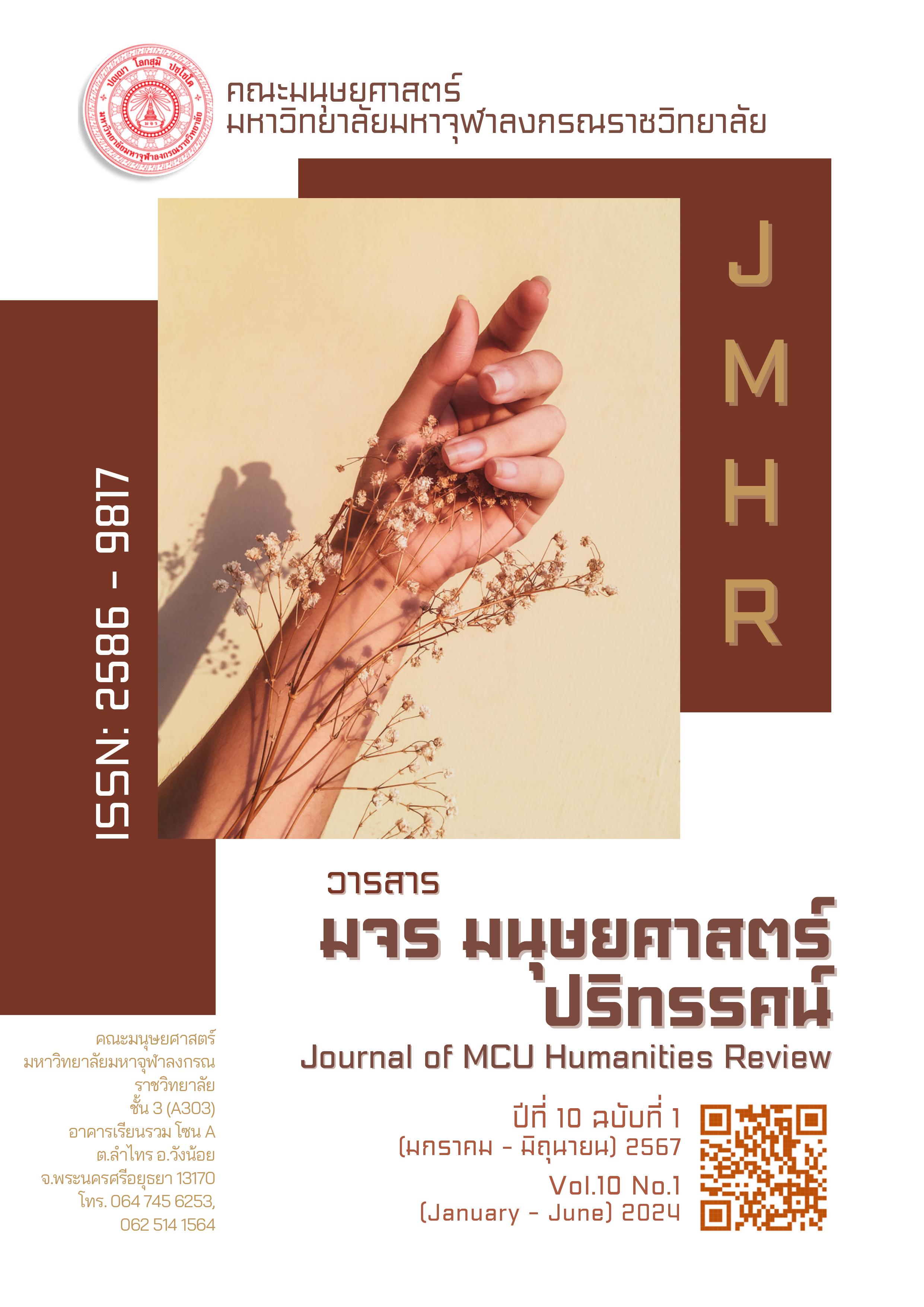Holistic health according to Buddhist Psychology of Individuals in Network Business Organizations
Keywords:
Holistic Health, Buddhist Psychology, Network Business OrganizationAbstract
The article that wants to discuss management of health, leadership, including the history of individuals in network business organizations for independent business people (independents), members (members) and customers (customers) from the currents of world change economic, social and environmental aspects Affects the lifestyle of personal well-being, both physical and mental, caused by stress. Anxiety Pressure regarding business and personal goals Family and corporate networks Leads to physical and mental disease. Management of holistic health using Buddhist psychology and positive psychology principles Integrated with network business concepts Develop your own potential to be mindful, intelligent, and manage problems with understanding. By applying the principles Promote the development of body, speech, and mind for quality management of the overall health of personal lifestyles. Build immunity in terms of physical, mental, social, intellectual, and emotional aspects. Become a model for creating holistic health according to Buddhist psychology for individuals in network business organizations. Expand to national society
References
จิรชฎา เชียงกูล และ เมธาวี อุดมธรรมานุภาพ. (2566). สุขภาวะองค์รวมในการทำงานอย่างมีความสุขอย่างยั่งยืนตามแนวพุทธจิตวิทยา. วารสาร มจร มนุษยศาสตร์ปริทรรศน์. 9(1), 387-389.
บริษัทแอมเวย์ (ประเทศไทย) จำกัด. วิสัยทัศน์. สืบค้น 18 ธันวาคม 2566, จาก https://www.amway.co.th/amway-vision
ประเวศ วะสี.(2550). ระบบการเรียนรู้ใหม่ ไปให้พ้นวิกฤตแห่งยุคสมัย. กรุงเทพฯ : สวนเงินมีมา.
พระครูสิริรัตนานุวัตร และคณะ (2559). พุทธจิตวิทยาบูรณาการ: รูปแบบและกระบวนการเสริมสร้างสุขภาวะองค์รวมของครอบครัวและสังคม (รายงานวิจัย). วิทยาลัยสงฆ์พุทธชินราช พิษณุโลก : มหาวิทยาลัยมหาจุฬาลงกรณราชวิทยาลัย.
พระพรหมบัณฑิต (2559). พุทธจิตวิทยากับสังคมและวัฒนธรรมไทย. กรุงเทพฯ : โรงพิมพ์มหาจุฬาลงกรณราชวิทยาลัย.
พระราชบัญญัติสุขภาพแห่งชาติ. (2550). ราชกิจจานุเบกษา. นนทบุรี : สำนักงานคณะกรรมการสุขภาพแห่งชาติ.
มหาจุฬาลงกรณราชวิทยาลัย. (2539). พระไตรปิฎกฉบับภาษาไทย ฉบับมหาจุฬาลงกรณราชวิทยาลัย. กรุงเทพมหานคร: โรงพิมพ์มหาจุฬาลงกรณราชวิทยาลัย.
มะปราง วิรากานต์ เสณีตันติกุล. การดูแลสุขภาพองค์รวม (Holistic Health) คืออะไร?. สืบค้น 18 ธันวาคม 2566, จาก https://rlax.me/th/blog/holistic-health-best-practices
ยงยุทธ วงศ์ภิรมย์ศานติ์. (2552). จิตวิทยาแนวพุทธ. กรมสุขภาพจิต: กระทรวงสาธารณสุข.
โรงพยาบาลศิครินทร์ ทีมแพทย์และผู้เชี่ยวชาญโรงพยาบาลศิครินทร์. โรคอ้วนภาวะอันตรายเสี่ยงหลายโรค. สืบค้น 18 ธันวาคม 2566, จาก https://www.sikarin.com/health/
ศูนย์เทคโนโลยีโลหะและวัสดุแห่งชาติ. ผลกระทบด้านบวกต่อสภาวะแวดล้อม. สืบค้น 18 ธันวาคม 2566, จาก https://www.mtec.or.th/bioplastic/environmental-impact/
สมเด็จพระพุทธโฆษาจารย์ (ป. อ. ปยุตฺโต). (2562). สุขภาวะองค์รวมแนวพุทธ. (พิมพ์ครั้งที่ 35). กรุงเทพฯ : มูลนิธิพุทธธรรม.
“_______”. (2564). พุทธธรรมฉบับปรับขยาย (พิมพ์ครั้งที่ 56). กรุงเทพฯ : บริษัทสหธรรมิก จำกัด.
สำนักงานสภาพัฒนาการเศรษฐกิจและสังคมแห่งชาติ. ประมาณการแนวโน้มเศรษฐกิจไทย ปี 2566. สืบค้น 18 ธันวาคม 2566, จาก https://shorturl.asia/s93eW
อัจฉรา วิเศษวร และพุทธชาต แผนสมบุญ. (2565). สุขภาวะองค์รวม: ผู้สูงวัยป่วยกายไม่ป่วยใจตามแนวพุทธจิตวิทยา. วารสาร มจร มนุษยศาสตร์ปริทรรศน์, 8(1), 435-436.
Handbook and Classification. (2004). American Psychological Association. Oxford University Press.
WHO. 1998. Adelaide Recommendation on healthy Public Policy. WHO: Geneva.
“_______”. 2005. Health Impact Assessment Toolkit for Cities Document 1 Vision to Action. WHO: European.
Downloads
Published
How to Cite
Issue
Section
Categories
License
Copyright (c) 2024 Journal of MCU Humanities Review

This work is licensed under a Creative Commons Attribution-NonCommercial-NoDerivatives 4.0 International License.






